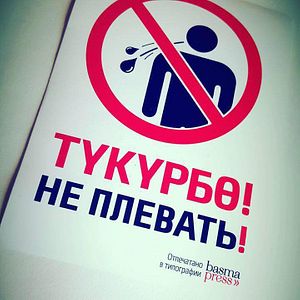On January 1, a bundle of new penalties for “negative behaviors,” including smoking in prohibited places, opening up manholes, and making false emergency calls, went into effect in Kyrgyzstan. The penalties included a hefty fine for anyone caught spitting in public, which has renewed a national debate over appropriate public behavior.
The fine for spitting — 5,500 som, or about $80 — is among the steepest among the new additions to Kyrgyzstan’s Criminal Code. Many are concerned about the scale of the fine, both relative to other penalties and to average salaries in the country. A 5,500 som fine for spitting costs an average citizen of Kyrgyzstan more than one-third of their monthly salary, with the proportion even more staggering for residents of the regions, where salaries are lower. The severity of the spitting fine does not match the severity of the crime; for example, according to the new statute in the Criminal Code, a person who “neglects their parental duties” faces a fine between 1,000-7,500 soms, meaning they could potentially pay only one-fifth the fine of someone who gets caught spitting on the sidewalk.
The spitting law is several years in the making, with its start in a citizen-organized sticker campaign in early 2016. Kushtar Mamytaliev and his friend were fed up with navigating gobs of spit on the sidewalk in Bishkek, so they printed a stack of stickers with a simple bilingual request: “Don’t Spit!” Not long after, then-President Almazbek Atambayev contributed 50,000 som from his social development fund to Mamytaliev’s passion project, and the stickers eventually went up all over the country.
“Don’t Spit!” has gathered a significant following on social media, with 22,000 users on its Facebook page. The page has long since moved away from focusing solely on saliva, and is something more of a digital “properness” brigade now, with posts in all-caps lamenting the backwardness of Bishkek natives and photos of misspelled signs or crumbling infrastructure. Commenters decry the “backward mentality” of their neighbors and complain about the inefficacy of the government.
This rhetorical focus on a national mentality and developing a collective sense of right and wrong is reflected in politicians’ defenses of the law. Prime Minister Mukhammadkalyi Abylgaziev affirmed the efficacy of penalties like the spitting fine on improving citizens’ behavior in public.
Not everyone is so sure that the Criminal Code is the wellspring from which morality flows, however. An Instagram post by @chala_kyrgyz features a young man and woman cuddling with the caption, “Sweetie, are you ready not to spit when you’re around me???” The photo pokes fun at the notion that the spitting law will spark such conversations between lovers, or that it could change widespread habits and attitudes overnight.
Others have taken advantage of the spitting fine’s severity to comment on the processes of maintaining law and order more broadly.
On January 7, 26-year-old Ramis Zakiriyaev posted a video of himself in front of the White House in central Bishkek, where lawmakers and government officials meet. “For these exalted officials, who only talk but never do anything… who have picked the country clean and continue to raise our country’s debts — this is in their honor,” Zakiriyaev said. After hawking up phlegm and spitting through the White House gates, Zakiryaev then proudly pulls out 5,500 som from his wallet and announces, “Here, come and take your fine.”
The earnest annoyance, satirical indifference, and fed-up frustration expressed through these three digital channels represent a range of methods by which Kyrgyzstanis can engage with the state. It appears that at least some government officials are paying attention, as Zakiryaev was picked up by police and brought to Bishkek for questioning about his loogie. “Don’t Spit!” also shares follow-ups from local bureaucrats on city beautification projects.
On the spitting fine in particular, word of citizens’ frustration with the scale of the fine has floated up to the highest levels of administration. Abylgaziev has already proposed scaling back the fine, and Deputy Prime Minister Jengish Razakov has called for the spitting fine to be lowered to 1,000 som to correspond with the fine for smoking in prohibited places.
Regardless of whether the prime minister actually moves to change the Criminal Code and reduce the spitting fine, the more promising take-away from this episode is that a robust civic culture is developing in Kyrgyzstan through creative use of social media.

































